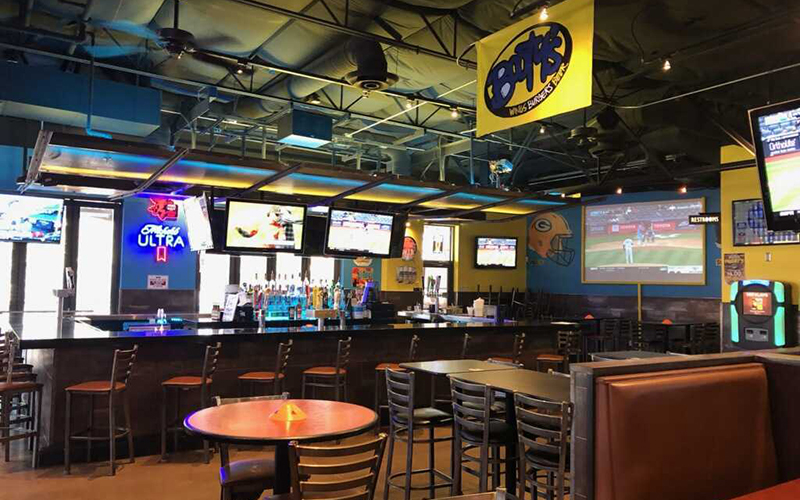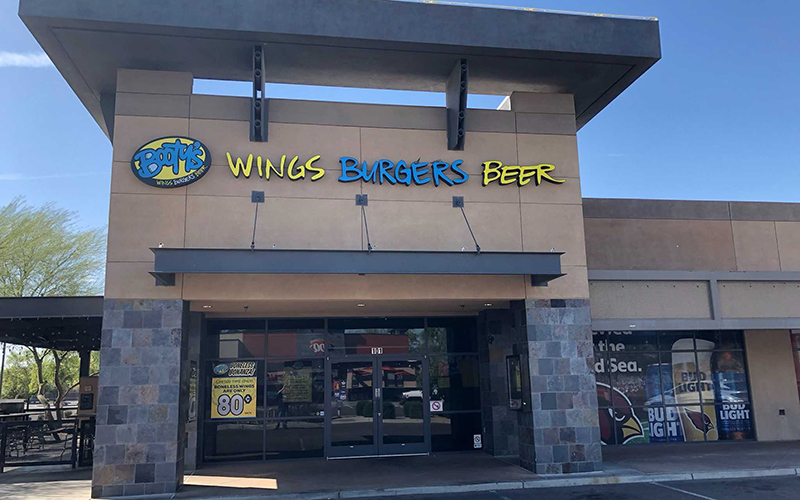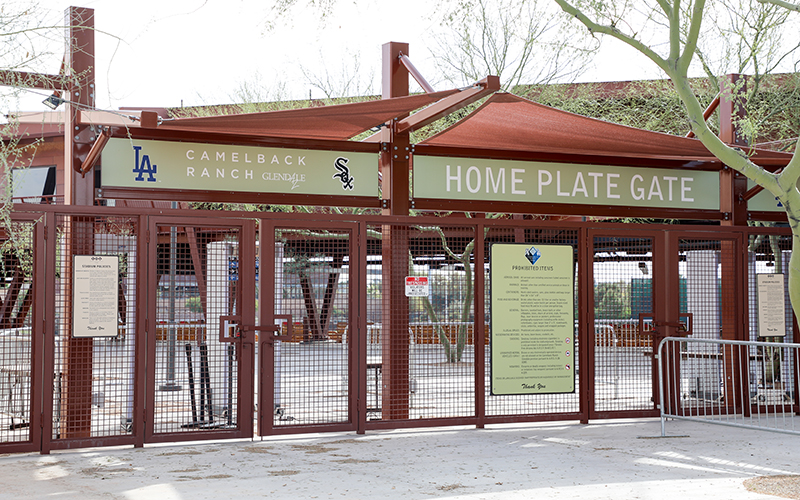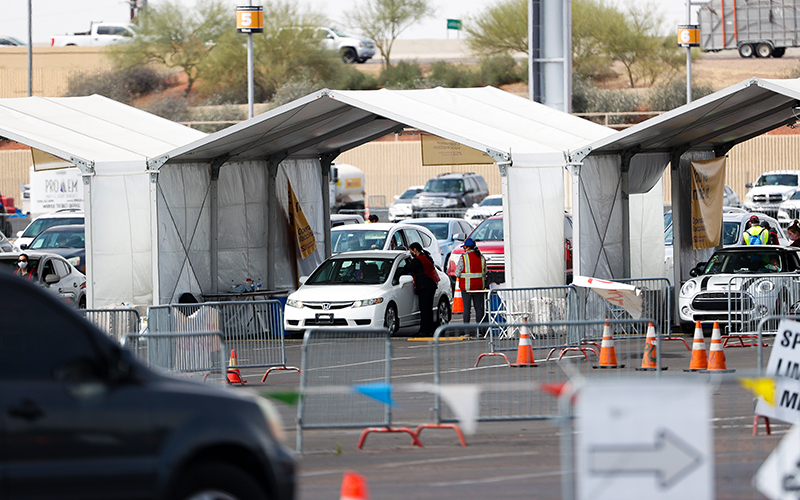
Booty’s Wings Burgers and Beer previously had some tables closed off and distanced, but has since returned to its normal layout as COVID-19 restrictions were lifted. Despite the change, the business has not been able to operate at full capacity due to understaffing. (Photo courtesy of Andy LiButti)
TEMPE – In a strange way, baseball bookended the COVID-19 pandemic, at least in Arizona. While the NBA was the first league to act and suspend its season on March 11, 2020, the virus’s ripples were not truly felt in the desert until the remainder of the Cactus League schedule was called off the next day.
A year later, the pandemic now a part of our everyday lives, the Cactus League returned. With vaccine rollout off to a promising start, limited numbers of fans were allowed to attend. COVID-19 isn’t over, but we’ve now reached Opening Day and the end appears to be within sight.
Spring training baseball sandwiched the worst months of the pandemic. And its return, alongside numerous new orders from Gov. Doug Ducey, signaled the beginning of a return to normalcy for many local businesses that rely on the boost in sales that Cactus League tourists bring.
Booty’s Wings Burgers and Beer has three locations, including two near spring training ballparks in Goodyear and Surprise. Business usually sees a boost every March, co-owner Andy LiButti said, but that spike was mitigated this year by limited fan attendance and team restrictions on off-field activities.
“We’ve definitely seen a drop-off in that business,” LiButti said. “Plus, we rely a lot on the people associated with the team coming in. The sports writers, trainers, announcers, a lot of the players, they would all come in. So with them not being allowed to really come out, that’s definitely affected us also.”
LiButti added that his takeout business has done well throughout the pandemic, but initially, he could only afford to keep his restaurants open for three hours per day. Ingredient costs have risen as well. LiButti said chicken wings that used to cost him $1 per pound have tripled in price.

Booty’s Wings Burgers and Beer (Goodyear location pictured) is one of many local restaurants that rely on annual revenue boosts from spring training crowds. But with Cactus League attendance limited this year, business has been slower than usual. (Photo courtesy of Andy LiButti)
Another local restaurant owner, Erick Geryol, said his business usually sees a 30% increase every spring. Geryol runs Boulders on Broadway, a bar and grill with locations in Tempe and Mesa. He mentioned that sales are down this year compared to last spring, despite the 2020 Cactus League’s premature ending.
According to a study by the L. William Seidman Research Institute at Arizona State University’s W. P. Carey School of Business, the shortened 2020 Cactus League season generated an estimated economic impact of $363.6 million. Of that total, $213.7 million contributed to Arizona’s gross domestic product.
While seemingly large, those figures pale in comparison to Seidman’s 2018 estimates of $644.2 million total and $373 million to Arizona’s GDP. The 2021 totals were likely even lower – while a full Cactus League schedule was played this year, the shortened 2020 season averaged 6,568 fans per game. In 2021, no stadium allowed more than 4,000 fans per game, and few allowed more than 2,000.
Additionally, tourism likely decreased significantly. In 2020, 1,446 of the 2,344 fans Seidman surveyed were non-Arizona residents, or just under 62%. These out-of-state fans had a median visit length of five days, excluding single-day visitors. Safety concerns mitigated interstate travel, likely impacting not only local restaurants, but the hospitality industry as well.
LiButti has noticed the decrease in travelers, specifically the “snowbirds” that typically come to Arizona in the winter and spring months to escape local climates.
“I think Surprise is a very right-leaning community,” he said. “So you get a lot of people that are, you know, ‘To heck with the masks. I’m not wearing these masks, they’re stupid,’ and everything. And I feel like there’s a lot of snowbirds that are kind of terrified, you know, ‘I don’t want to get sick and die.’ So we’ve definitely felt it, not just for spring training, but for all of the snowbird season. People just aren’t traveling.”
Despite these limitations, one owner has actually seen an increase in sales. Dillon McClelland runs Goldwater Brewing Co., which has brewery and tap room locations in Scottsdale and East Mesa. McClelland was able to get creative, opening his back patio usually only used as a seasonal “beer garden” to provide additional outdoor space.
But most importantly, they introduced canned beer sales. Previously, the business had only sold beers in-house. But they began marketing exclusive canned beer releases, which led to many online orders and long lines at the door to pick them up.
“Starting out, that’s basically how we were able to keep all our staff, stay afloat, and basically come out of this pandemic kind of better than we came in,” McClelland said. “Because we actually have another platform to sell our beer.
“We kind of took it as a learning opportunity and basically came out of it with a grown opportunity to sell our beers on a different platform, in cans, for to-go beers,” he added.

In 2021, Camelback Ranch, home to the Los Angeles Dodgers and Chicago White Sox, allowed only 18% fan capacity, or 2,460 of a usual 13,200 maximum. This had a ripple effect on local businesses that usually benefit from spring training tourism. (Photo by Alina Nelson/Cronkite News)
Each of the three businesses have also seen significant demographics changes. Most older customers have shifted to online order and pick-up at Goldwater, while LiButti and Geryol have seen sharp decreases in that age group at Booty’s and Boulders respectively.
“Our Tempe location is close to campus and most people that are 30 and up, especially some of the professors that have come out for years, they won’t come out at all,” Geryol said. “They’re very, very cautious. They don’t want to put themselves at any type of risk. But then a lot of the students, they come in and we have to ask them to please wear a mask, you know, kind of keep them at their own tables and stuff like that.”
Geryol said some guests have become aggressive with managers when asked to follow safety guidelines, while others have left Google reviews criticizing the restaurant for being unsafe. He also noted that guests have been “more cavalier” at his Mesa location than in Tempe, possibly due to political leanings.
With Ducey lifting COVID-19 restrictions on businesses on March 25, each owner is now left to decide how to handle safety measures going forward. Masks have never been mandated state-wide, but the new order prohibits counties and cities from enforcing their own mask laws on private entities. It also removes distance and capacity guidelines.
This might not be a problem for Geryol, who said he hasn’t been receiving enough business at Boulders to warrant the increase to full capacity. LiButti no longer requires masks for customers, but is unsure if he will be able to return to full capacity because Booty’s is now understaffed.
“With the extra money that people are getting, you know, the extra $300 a week, nobody wants to work,” he said. “I mean, we constantly have had ads out for the past, gosh, I want to say six months, and applications just trickle in. It’s unreal. I would love to seat every table and chair in my restaurant, but I can’t because I don’t have the staff to take care of the guests.”
For McClelland, the decision is much more difficult. For now, he is still enforcing CDC guidelines. But with Goldwater succeeding as is, he knows he needs to balance safety, profits and what is sure to be a divided public reaction.
“I guess we don’t have a decision on that yet,” McClelland said. “I think we’re trying to figure that out currently. But we’ve been doing kind of the same. Our staff is still wearing masks, we usually have masks ready for people that walk in and I believe we are still enforcing them at the moment. It’s kind of hard because you’re damned if you do, damned if you don’t. You’re always going to have the people that, you know, ‘Good job, keep the masks on, keep going with that,’ and then you have the other people that are basically saying, ‘I won’t support you, it should be a freedom of the person to decide if they want the mask or not.’
“So it’s kind of a sticky decision that whatever decision we make, it’s going to affect other people. But you can’t make everyone happy.”


